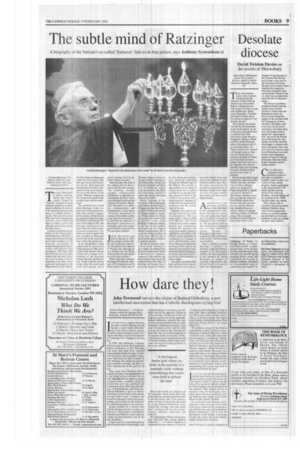Page 9, 9th February 2001
Page 9

Report an error
Noticed an error on this page?If you've noticed an error in this article please click here to report it.
Tags
Share
Related articles
Vatican It And The School Of Fear
Into The Explosive Minefield Of Politics
What's Wrong 1n The Church?
Lutherans Belong With Catholics,
From Outcast Theologian To Pope's Favourite
How dare they!
John Townsend surveys the claims of Radical Orthodoxy, a new intellectual movement that has Catholic theologians crying foul iT IS RARE THAT a complex idea from the quiet world of theology should become a minor media phenomenon, even more so that its creators should be lauded as trendy or cool. Yet it appears that three Anglican theologians at Cambridge have managed to do just that.
In 1999, John Millbank, Catherine Pickstock and Graham Ward published Radical Orthodoxy: A New Theology, and since then they have enjoyed unprecedented media coverage on spiritual talk shows and in academic magazines. The reason for this is simple. In their theology, they preach an astonishingly attractive message, one that is in direct contradiction to the spirit of our age.
They argue that Christian faith is essential not only to our spiritual lives but to the living of our everyday lives as well. Although this may appear as simple common sense, academic theology decided this view was superficial and incoherent in about 1890, under the influence of Schopenhauer and Nietzsche. Radical Orthodoxy's aim is to demonstrate how a society built on the assumption that "God is dead" is nihilistic and destructive because it means that peace, stability, and morality are determined by the selfish domination of the powerful.
Sounds familiar? It is exactly what Catholic theology has been saying since Vatican II. The problem with Radical Orthodoxy for Catholics is that it bases its validity in postmodernism, not on the Holy Scriptures.
It starts with the postmodern premise that all secular forms of knowledge, such
as political theory or economics, are validated only by the approval of those in political power, and because of this are subjective and not universally applicable. Radical Orthodoxy contends that only absolute and transcendent truth can make knowledge something more than a mere prop for material power. And that truth can only be found in the truth derived from God. Thus, by looking negatively at the material world, proponents of Radical Orthodoxy have circuitously arrived at Catholic teaching, which comes to the same conclusion by looking positively at the words of Christ.
Such is the novelty and simplicity of this argument, which neatly deals with postmodernism and cleconstructionalism in one fell swoop, that it has caused a storm of frenzy in universities all around the world. Radical Orthodoxy seems wonderfully versatile, and some argue that it could pave the way for a reconciliation between Anglicans and Catholics.
Not surprisingly, Catholic theologians have cried foul. This volume, Radical Orthodoxy? — A Catholic Enquiry is a collection of essays written as a result of a conference held at Heythrop College in June 1999. There, Millbank, Pickstock, and Ward came under scrutiny from a battery of the best Catholic theologians in the business, including Laurence Paul Hemming, Fergus Kerr cw, and James Hanvey sr.
The academic ferocity of the debate is immediately evident in these essays. Hemming is Radical Orthodoxy's most vociferous critic, making the charge that the movement is "colonising" Catholicism, assimilating and adapting its doctrines as it sees fit. His comparison of Radical Orthodoxy and the thought of Thomas Aquinas vilifies Pickstock's analysis of the Summa Theologiae. In a memorable phrase, he condemns Radical Orthodoxy as "a theological theme-park, where we frolic, say, in the pastiche of a re-constructed and romantic castle, stunned by its prettiness, without ever remembering that castles were built to stabilise and defend the land".
IT IS IN THIS FIERY and elevated rhetoric that the main interest is found for the non-academic reader. The essays are fairly hard to follow in places, but the force of the arguments and the originality of the analogies ensure that they hold our attention. This volume will be of immense value for theologians everywhere, but it will also be useful for average believers who simply wish to keep abreast of the Catholic position.
As a movement that manages simultaneously to place God back in the centre of theology, capture public imagination, and usher in a new age of postsecularism, Radical Orthodoxy is set to rock the theological world further, a worrying thought that makes this lucid Catholic enquiry all the more welcome.
John Townsend is a pupil at Ampleforth
blog comments powered by Disqus













